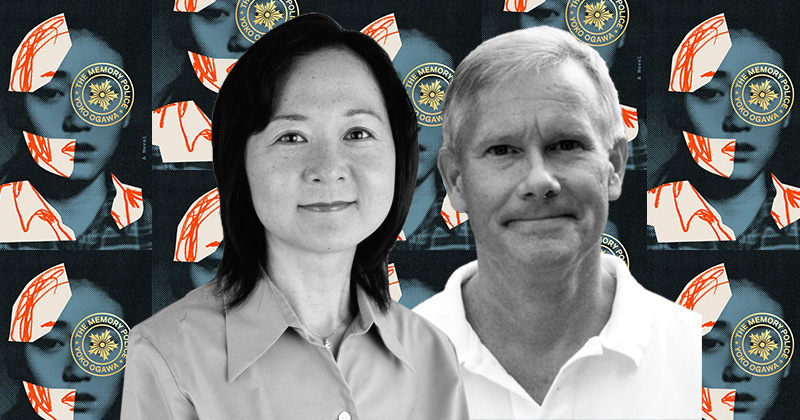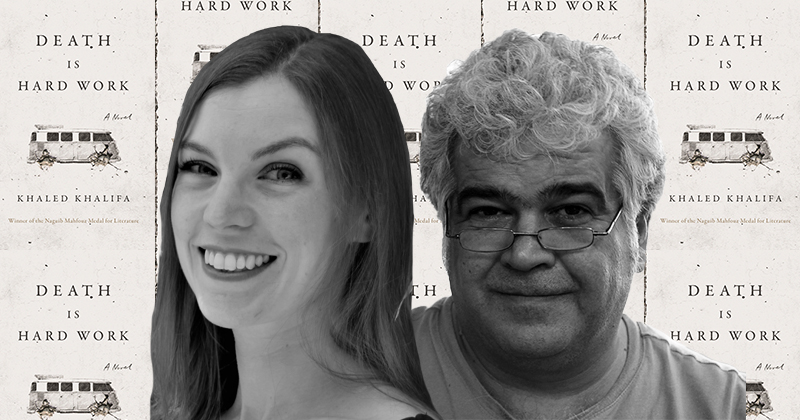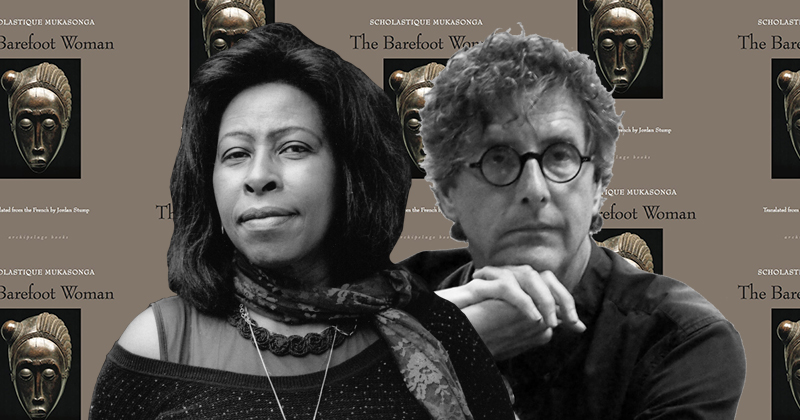
Meet the Finalists for Next Week's National Book Awards
Interviews with Some of Our Finest Living Writers
LITERATURE IN TRANSLATION

Yoko Ogawa and Stephen Snyder, author and translator of The Memory Police (Pantheon)
What time of day do you write?
YO: In the morning. Whether or not the day is a success depends on how much I’m able to write in the early hours. As soon as I wake up, I sit down with the novel I’m writing. Before taking a walk, reading the newspaper or any other excuse to procrastinate presents itself, I enter the world of the story.
SS: In the interstices. My job with the Middlebury Language Schools keeps me busy.
How do you tackle writer’s (or translator’s) block?
YO: By just writing. Even when I can’t write, I write.
SS: One pleasure of translating is that “translator’s block” isn’t really a thing. Someone else has already suffered through the doubts and questions that can upend the writing process. Translators encounter puzzles and obstacles, but they’re the kind that can generally be resolved with enough effort.
Which book(s) do you return to again and again?
YO: Anne Frank’s The Diary of a Young Girl. It’s the book that first taught me that the act of expressing something in words can free a human being.
SS: Anything by John Ashbery or Elizabeth Bishop.
Which non-literary piece of culture—film, tv show, painting, song—could you not imagine your life without?
YO: Musicals. The moment when you enter the theater with a ticket to a musical in your hand is a moment of irrational joy.
SS: Korean ceramics. The early Neil Young.
What has your experience being translated (or translating this book) been like?
YO: It’s the experience of seeing off a child who is leaving on a long journey.
SS: An enormous pleasure. Despite the prevailing darkness, it’s a luminous book with many moments of intense beauty, and the clarity and precision of Yoko Ogawa’s prose is a joy. Translating it felt like a natural, organic process, something that was necessary.
*

Khaled Khalifa and Leri Price, author and translator of Death is Hard Work (FSG)
Who do you most wish would read this book?
KK: Everyone, especially my childhood bully.
What’s the best book you read this year?
KK: The River of Gold in Aleppo’s History and a history book about Aleppo’s history in three volumes, by the historian Sheikh Kamel Al Ghazi.
What do you always want to talk about in interviews but never get to?
KK: Remorse.
LP: Imposter syndrome. Also: respect trans people, they know best what gender they are/n’t and let’s all stop obsessing about what’s in their underwear.
Who was the first person you told about making this list?
KK: Yasmina Jraissati, my guardian angel.
What time of day do you write?
KK: From 12 to 5 o’clock in the afternoon.
How do you tackle writer’s (or translator’s) block?
LP: I cook something. Lasagna is good, but baking a cake also works well. It’s so satisfying to do something that has a tangible result, and it seems to melt the frustration that is cause and effect of being blocked. Plus, you get to eat cake afterwards.
If the writer I’m translating mentions music in their books, then I try going for a walk and listening to that music as well. Khaled is particularly great for this.
Which book(s) do you return to again and again?
KK: All of Dostoevsky’s books.
LP: It changes from year to year, but at the moment it’s The Diary of a Provincial Lady by EM Delafield. I could say that it is a study in how to sound effortless, but honestly it’s just so funny and charming. I also enjoy regular visits with my close personal friends in A Suitable Boy by Vikram Seth. It’s my talisman during the familiar discussions with editors about the amount of Arabic words left in English translations. Unfamiliar words aren’t scary, they’re exhilarating and poetic and they communicate regardless.
Which non-literary piece of culture—film, tv show, painting, song—could you not imagine your life without?
LP: Kirsty Merryn’s “Bring Up the Bodies.” I used to sing and drum this to my daughter when she was a baby and it was like a magic charm to stop her from crying. (Admittedly, now she’s old enough to understand the words it might have the opposite effect.) That whole album is the soundtrack to some of my most precious memories.
What’s the best writing advice you’ve ever received?
KK: Don’t ever listen to advice and try everything you can.
LP: Read it out loud. And go for walks—writing (and translating) don’t happen solely in front of a computer screen.
What has your experience being translated (or translating this book) been like?
KK: Beautiful, with my lovely translator Leri Price.
*

Scholastique Mukasonga and Jordan Stump, author and translator of The Barefoot Woman (Archipelago Books)
Who do you most wish would read this book?
JS: I’d like this book to be read by anyone who dismisses the humanity of others.
SM: I would like Salaa Saleh to be able to read my book. She’s a young woman in Khartoum, Sudan who stood up against dictatorship—she’s known as “the girl in white.” For the sake of her people, she fights for liberty, democracy and justice. I read on the internet that she sees herself as a successor to the Kandaka, the Nubian queens who reigned long ago over the ancient kingdom of Meroë. My mother Stefania also drew on tradition to save her children.
I will also dedicate my book to all female resistance fighters. I’m particularly thinking of Marielle Franco, who was assassinated in 2018 in Rio de Janeiro. And I’m thinking of her mother, whom I held in my arms, a woman in pain, but a woman of great strength, fighting to expose the truth about her daughter’s assassination and demanding justice.
What’s the best book you read this year?
SM: From this past year, I’m choosing two Toni Morrison books, Beloved and the essay collection The Origin of Others. I’ll add Between the World and Me by Ta-Nehisi Coates for its fight against the obsession with skin color.
Who was the first person you told about making this list?
JS: My first thought was actually how to get out of telling anyone. It’s a tremendous honor, of course, and I’m delighted in every way, but these things make me a little nervous.
What time of day do you write?
JS: I translate when I can, which is to say that I spend much less time translating than I would like. I teach, so I have to work around class preparations, grading, meetings, etc. At irregular intervals, a little stretch of free time comes along: that’s when I translate. In some perfect world, I would be able to translate or revise for hours at a time, preferably on a cool, rainy afternoon, but I’m not sure that’s ever going to happen.
How do you tackle writer’s (or translator’s) block?
JS: I just force the words out, whether they’re any good or not, sometimes even whether they make sense or not: just force the words out, and then make use of the translator’s most important tool—time—to reread, rethink, rework. Little by little (and in my experience it can only happen little by little) the text will begin to cohere and take shape; but you can’t wait for that to happen, you’ve got to make it happen, and often that means simply forcing it.
Which book(s) do you return to again and again?
SM: Night by Elie Wiesel and If This Is a Man by Primo Levi are my bedside reading. They were my guides and my supports in the difficult work of memory that was placed on my shoulders by the Tutsi genocide and my family’s massacre. I believe it was a few sentences in Night that made me see how meaning might be given to the fact of having survived, and that allowed me to overcome survivor’s guilt and despair by writing.
Which non-literary piece of culture—film, tv show, painting, song—could you not imagine your life without?
JS: Beethoven’s piano sonatas (all of them). Also Schubert’s. Also Prokofiev’s, and all piano music by Brahms.
What has your experience being translated been like?
SM: My writing comes from a genocide. It’s a story that has questions to ask of all humanity. My mother tongue is Kinyarwanda, yet I write in French. French is my language by pure chance, thanks to the vagaries of colonization. If I had gone into exile in Uganda like many Tutsi, I would probably have written in English. I don’t renounce my adopted language, I feel comfortable in it. Nevertheless, I pepper my writing with Kinyarwanda words to remind you of the origin of my writing. It goes without saying that I would like my books to be translated into every possible language, to liberate them and give them new lives thanks to the talents of translators.
At its heart, I thought, this was a book about motherhood and daughterhood—meanwhile being a moving tribute to the women of the community—what were the challenges of exploring womanhood amidst the horrors of the Rwandan genocide?
SM: The Barefoot Woman is built on memories of my childhood in Nyamata, to which my family and many other Tutsi were deported in 1960. They were exterminated there in 1994. Destiny decided that I would survive, that I would protect the memory of all those who were lost. I cannot describe the horror of the daily persecutions and repeated massacres we endured. But in Nyamata, there was also the life I lived day to day, and a childhood that our parents wanted to be ordinary. I like to describe the works and days of that struggling community in close detail, so as to preserve their traditions against all odds. Many of my readers have told me of the pleasure they find in the ethnological parts of my book. And it’s true that, even living in exile, my mother Stefania, like all Rwandan mothers, strove to salvage and to share all the Rwandan traditions she had learned from her mother. The book is a homage to my mother; now it’s my turn to guard the tradition she passed down to me.
Translations of Mukasonga’s answers by Corinne Segal
*

Ottilie Mulzet, translator of László Krasznahorkai’s Baron Wenckheim’s Homecoming (New Directions)
What’s the best book you read this year?
The Silence of the Girls, by Pat Barker. I feel that Barker’s centering of the story of the Trojan wars in the experience of the enslaved women is a genuinely radical gesture. “No words from women in this period survive,” as Emily Wilson put it.
How do you tackle writer’s (or translator’s) block?
I don’t get translator’s block, instead I get translator’s fatigue, meaning that I regularly need to take short breaks to recharge my batteries. Perhaps it is something about following someone else’s train of thought so closely, the sheer intensity of thoroughly inhabiting another writer’s voice. There are times, though, when I’m stuck on a specific problem (for example of wording), and usually the solution to something like that will suddenly pop into my head at quite another time.
Which book(s) do you return to again and again?
Virginia Woolf’s The Common Reader, her diaries, and in Hungarian, the short stories of Miklós Mészóly, the poetry of Zsuzsa Beney and her critical essays, the poetry of Ágnes Nemes Nagy and her essays, the poetry of János Pilinszky and his shorter prose pieces, the diaries and essays of Imre Kertész.
Which non-literary piece of culture—film, tv show, painting, song—could you not imagine your life without?
There is one particular Mongolian long song, “Dream of Gobi,” that I am very grateful to have heard in my life. It’s on a pentatonic scale, spanning at least two octaves, like most Mongolian long songs. My favorite version is by the singer Chimidtseye (the lyrics are by the poet B. Lhagvasüren). In it, the daughter of a camel herder sings of seeing the moon float by in her cauldron of milk and her mother in a dream (“In a clear dream, I am encircled by my mother.”)
What has your experience being translated (or translating this book) been like?
Uncanny. More than once, when traveling in Hungary (usually to the Translators’ House by Lake Balaton), I found myself encountering one or more of the characters in person. One day I was on a local commuter train to Székesfehérvár, and suddenly, the Professor was sitting there across from me.
Also finalists: Pajtim Statovci and David Hackston, author and translator of Crossing (Pantheon)
Emily Temple
Emily Temple is the managing editor at Lit Hub. Her first novel, The Lightness, was published by William Morrow/HarperCollins in June 2020. You can buy it here.












